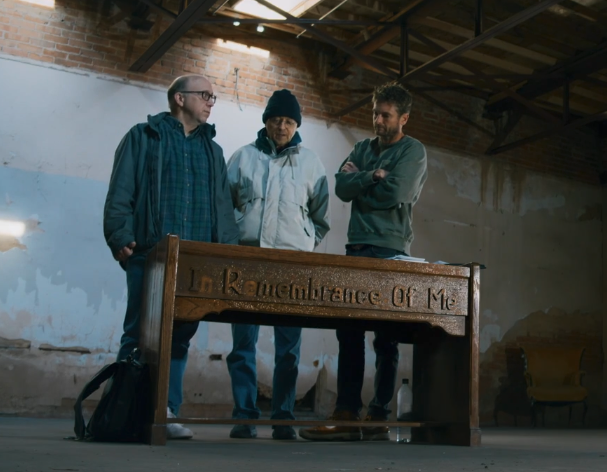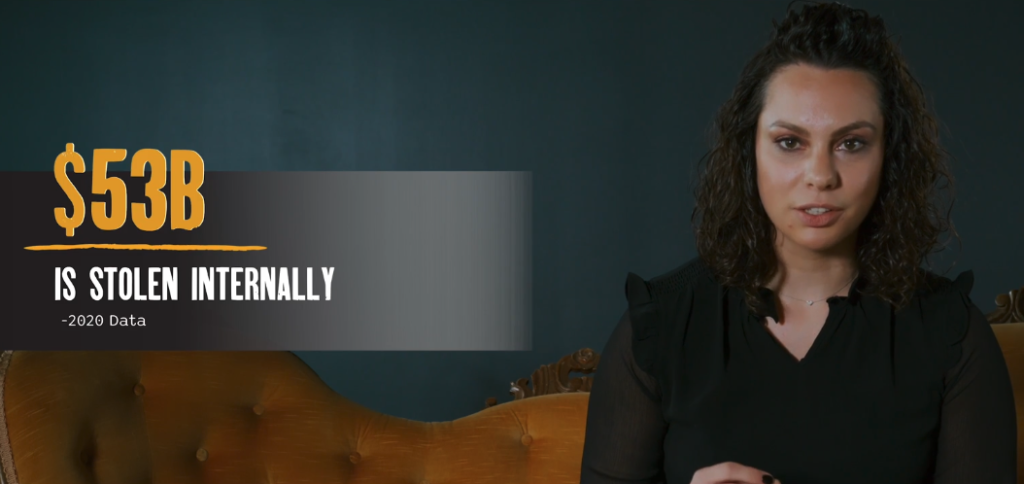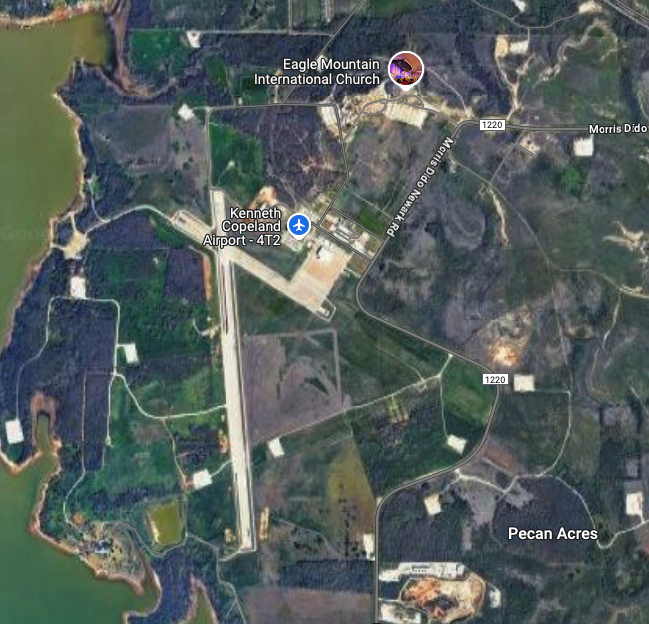
(Screenshot: Right to left, documentary filmmaker Nathan Apffel, Trinity Foundation president Pete Evans and Trinity Foundation staff investigator Barry Bowen discuss Samaritan’s Purse’s Alaskan operations in Episode Two.)
Trinity Foundation collaborated with filmmaker Nathan Apffel on a seven-part documentary series called The Religion Business, which was released this week.
The wide-ranging documentary focuses on religious fraud and offers a withering examination of the failures of megachurch/ prosperity gospel ministries with contributions from scholars, legal experts and journalists.
The series is available for purchase on the film’s website before reaching Amazon, Apple TV and Roku streaming platforms in two weeks.
Filmmaker Nathan Apffel grew up attending a non-denominational church, was part of the church group, and in his adulthood began to seriously question how and why churches operate the way they do: “I need to ask the toughest questions of my own faith. You might ask, ‘Why?’ Because I hold my faith institution to the highest standards and judgment begins with the Church. All I can say for the moment is good intentions can have devastating consequences. The wolves will feed, the saints will sacrifice, and rivers of endless money will flow.”
The documentary compares the extravagant spending of televangelists to Christians operating ministries for the poor and homeless in Uganda where thousands of people had to flee for their lives due to the terror campaign conducted by the Lord’s Resistance Army.

(Screenshot: Catholic nun Sister Rosemary followed Jesus’ instruction to “love your enemies.” The story of these children is told in Episode Six.)
AC Black, founder of She Is More Than, tells Nathan, “There are two million street children in Uganda.”
In this broken world, the Church is also broken.
Gina Zurlo, Co-Director of the Center for the Study of Global Christianity and editor of the World Christian Database, explains that more money is embezzled by “Christian” religious leaders than is spent on world missions.

(Screenshot: Gina Zurlo creates a statistical summary of global Christianity published in the annual January issue of the International Bulletin of Mission Research.)
A couple of years before the documentary release, Apffel interviewed Zurlo and learned her team estimated that ecclesiastical crimes, embezzlement by religious leaders, topped $53 billion in 2020. When viewers watch the final episode, they will learn that financial crimes in the church have soared since 2020. The amount currently embezzled has mushroomed partly due to inflation. However, the 24 % increase in inflation since 2020 would only account for approximately one third of significant rise in crime.
Development economist and author Bruce Wydick describes one of the reasons for American Christianity’s inept response to global poverty and other issues: “We just don’t know about things going on overseas. We don’t know about poverty. We don’t know about wars, oppression or different things that are unpleasant for us to think about. And so, we kind of tune them out and in that way, we stay ignorant by our own choices. Sometimes behavioral economists call it ‘strategic ignorance’ where we choose to remain uninformed about things because then we would learn about those things that are unpleasant.”
This description of “strategic ignorance” can also explain the horrible state of biblical illiteracy in the Church, where many people fail to “study to shew thyself approved unto God.” – 2 Timothy 2:15 KJV
Apffel investigates televangelist Kenneth Copeland’s Revival Capital of the World project, pastor Ed Young’s housing allowance and extravagant lifestyle, an alleged disappearance of assets from Judah Smith’s Churchome and Franklin Graham’s ministry camp operating in Alaska more than 4,000 miles away from the ministry headquarters.
The first episode features a short montage of quick video clips of megachurch pastors/televangelists highlighting their obsession with money and material things. In one clip Ed Young says, “God gave me a Ferrari because I am a Ferrari.”
Trinity Foundation provided Apffel the address of Ed Young’s beach house in the Florida Keys which is worth an estimated $10.3 million, whose ownership is hidden by a web of limited liability companies and also gave Apffel a document revealing Ed Young’s 2005 housing allowance of $240,000 yearly.

(Screenshot: Satellite view of Young’s beach house and pier.)
Apffel also visited Eagle Mountain International Church, home to Kenneth Copeland Ministries and Kenneth Copeland Airport.

(Screenshot: Satellite view of Eagle Mountain International Church property in Newark, Texas.)
When Copeland first acquired the property, his plans for the Revival Capital of the World included a Christian retirement community and other projects for which he fundraised but never built.
A confidential informant reveals that megachurch pastor Judah Smith sold off $61 million in church real estate and doesn’t know where all the money went.
The series includes re-enactments of historical events and portrays the sale of indulgences, one of the biggest scandals in Church history.
Grove City College professor and church historian Carl Trueman provides interesting analysis for the evolution of Christianity: “You might say, the birth of church marketing itself takes place with the Reformation.” Trueman also explains the Catholic Church differentiated itself from the Protestant church through expensive art.
Several questions play a major role in the series: What is a church? Does tithing apply today? How do tax laws apply to religious institutions?
The combination of tithing and investing turned the Mormon Church in America into one of the world’s wealthiest non-profit organizations. In a video clip, Mormon Church President Russel M. Nelson says, “Tithing will keep your name enrolled among the people of God and protect you in the day of vengeance and burning.”
In his book Faith-Based Fraud, author Warren Cole Smith writes that “faith-based fraud is almost always predictable, and bad theology is that predictor.”
The Mormon Church, also known as The Church of Jesus Christ of Latter-day Saints, teaches polytheism, the belief in many Gods. This theology is most notable in the Mormon creation account.
To understand the tax code, Apffel interviewed Phil Hackney, an attorney that previously worked in the Office of the Chief Counsel of the IRS. Hackney doubts the IRS can effectively provide oversight of religious organizations: “You can file a complaint with the IRS, but the question becomes, “Has it gone into a black box or not?”
Hackney also explains the role of associations of churches and integrated auxiliaries, which are parts of churches, and are not required to file the non-profit Form 990 tax return disclosing how the non-profit spends money. This loophole in the tax code is one of the primary reasons that many large media ministries operate without financial transparency.
Journalist Julie Roys explained to Apffel why self-regulation doesn’t work well: “People need to understand. The ECFA (Evangelical Council for Financial Accountability) is funded by its member organizations, so the organizations that it’s holding accountable are the ones that pay them money every year.”
The role of whistleblowers is often critical to investigations and exposing corrupt institutional leadership. Ruth Malhotra, a former spokeswoman for Ravi Zacharias Ministries (RZIM) talks about her motivation to speak out: “Throughout that time I constantly had to ask myself, ‘Am I keeping quiet to protect the system or am I willing to speak truth no matter where that leads?'”
RZIM requested the IRS reclassify the ministry as an association of churches. Ruth believes the reclassification was part of a coverup: “Ravi himself, presented this himself to our staff. This is about religious freedom. That is what they said. I believe the actual reason the organization pursued that route was because it allowed them to conceal and enable much of the corruption taking place.”
Apffel is also launching a mobile app Broken Shepherds for connecting Christian donors and ministries. Non-profit organizations can join and will receive a rating based on the information they provide that rewards transparency.
